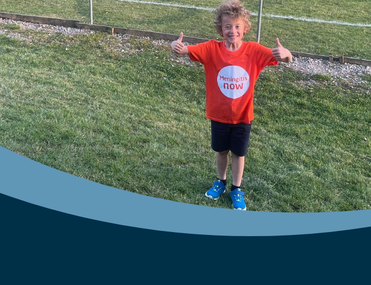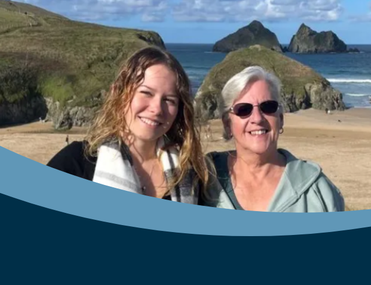“I feel alive when I am hiking and problems seem less overwhelming.”
After a trip to A&E where Caroline was told her symptoms were a ‘GP problem’, she went home to try and manage her severe headache.
When it became unbearable, Caroline took herself back to the hospital.
Deteriorated
Caroline told us: “After waiting for 12 hours, I was admitted with suspected viral meningitis. Over the next couple of days I deteriorated but I was told that the lumbar puncture they performed had come back negative. I was advised to go home again.”
Caroline’s father, who had accompanied her to hospital, was unhappy with the hospital’s advice and asked to speak to a doctor. Later, it was revealed that not all of Caroline’s test results had come back and the doctor apologised. By this time black blisters had started to appear on Caroline’s skin.
After seeking a second opinion, Caroline was seen by a different doctor who immediately started a course of antibiotics and ordered more tests. Finally, after days of agony and misinformation, Caroline received the news that she had bacterial meningitis.
The new antibiotics soon started working, and Caroline was able to leave the hospital three weeks later. However, her physical health had taken a massive hit and she was unable to perform simple tasks like getting up the stairs to use the toilet.
Overwhelmed
Caroline says: “I was so overwhelmed by everything. I couldn't stay awake or do anything. I had no idea how I would ever do anything again but also felt guilty because I knew I had been really lucky to survive.”
Caroline’s hearing and lungs were affected, and she had tissue damage due to the septicaemia. She wanted more information about after-effects and how to manage. That’s when she came across Meningitis Now.
“I emailed Meningitis Now as I didn't feel able to maintain any sort of conversation. The reply I got gave me so much hope and relief that what I was experiencing was completely normal and that it is unrealistic to expect to bounce back after such a debilitating illness. Reading other people's stories of it taking two years to start to feel normal gave me hope that how I felt was typical and perfectly normal.”
Small but mighty steps
For Caroline, seeing the stories of others’ recovery journeys made a huge difference to her outlook. She gave herself time to rest, and then would attempt to take small but mighty steps in the direction of better health.
“I started off walking down the stairs, then to the end of the garden and built it up each day. Most days I didn't want to get out of bed and go for a walk but I forced myself to do it, saying that I could sleep again as soon as I got back. Three months later I was able to walk three miles twice a day - I would have never believed that possible at the beginning.”
Caroline cites the reason for her change in mental approach was down to Meningitis Now’s support. Now, Caroline wants to give back to the charity that helped her in her darkest hour.

50 mountains
Walking has been the most beneficial hobby for Caroline’s continued recovery. With her 50th birthday coming up, and when she finally felt better, Caroline decided to take on the challenge of walking up 50 mountains to raise money for Meningitis Now.
Caroline says: “I wanted to raise money for Meningitis Now so that they could support as many people as possible who have had to suffer due to this devastating illness. They understand meningitis, septicaemia and recovery better than anyone and are able to help people who are often just abandoned to get on with it when they are discharged from hospital.”
Excited
Now that Caroline is back on her feet, there’s no stopping her. Even the thought of scaling 50 peaks of over 600m each isn’t daunting her.
“I am so excited about all the different places I am going to see and the different people I will meet. The views are incredible and I feel alive when I am hiking and problems seem less overwhelming. I have already walked a few of the mountains and enjoyed the challenge.”
Whilst she is walking, Caroline will reflect on how lucky she was to survive her experience, but also the improvements that need to be made to after-care for meningitis patients: “the hospital aftercare people receive is typically poor or non-existent and it can take many years to recover from this. I wasn't 'fixed' just because I had been released from hospital.”
Watch a video of Caroline’s journey so far. If you would like to support Caroline, visit her fundraising page.



